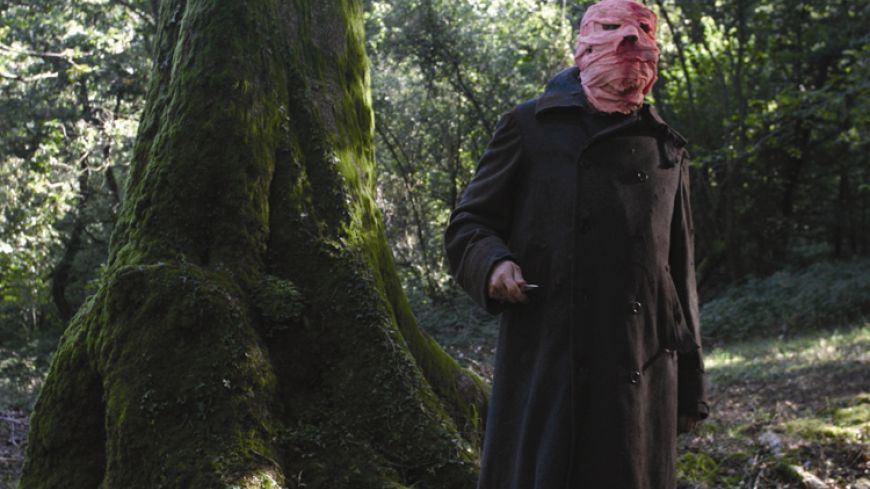
While looking out on the woods beyond his new home with binoculars, Hector (Karra Elejalde) catches sight of a young woman, face hidden, exposing her breasts.
His wife Clara (Candela Fernández) momentarily distracting him before driving off into the nearest town. Hector returns his attention to the woods and goes to investigate. He finds the woman naked, unconscious or dead, but is then attacked by a man in a greatcoat whose face is swathed in bandages before he can attend to her further. Stabbed in the arm with a pair of scissors, Hector manages to evade his pursuer and breaks into a nearby building. It is devoid of life and full of hi-tech equipment. Hector soon learns that he has been unwittingly subjected to a time travel experiment, giving him the opportunity to travel back a half-hour or so and thereby save the woman from the maniac...
This Spanish made thriller manages to just about make the old time travel paradoxes, familiar from half a dozen episodes of Star Trek or popular films like Back to the Future, fresh by way of combining them with more uncanny touches recalling the likes of Lost Highway and Meshes of the Afternoon, with their mobius strip constructions and doppelgangers. Dead of Night's 'why did you have to break your glasses' meanwhile commutates into a 'why did you have to take out your binoculars' to provide that always useful subtext around the dangers of (male) voyeurism for the more theoretically inclined types.
Though Nacho Vigalondo's direction is effective, making the most of relatively limited resources – basically four locations and four performers – and generating plenty of tension and shocks, I think I would really have to see Time Crimes again a second time to be able to fairly judge it. This is because, with the second time around sections of the film, a number of new details are foregrounded which may or may not have been there for the observant viewer to notice the first time: if the former is the case, then Vigalondo's handling is excellent, if the latter it is 'merely' very good.
Vigalondo's writing is effective, but not quite at the same level. The central surprise revelation is really not that surprising – what sort of professional slasher movie maniac would stab their victim once in the arm with scissors in such an amateurist manner and leave it at that? – although the 'proper' ending has a nicely ironic touch that I wouldn't be surprised is altered for the forthcoming Hollywood remake.
Similarly while the young woman will likely remain the same, given that there are no shortage of young actresses in Hollywood equally willing to expose their breasts in the name of art and a 'tits and a scream' horror career, the everyman and everywoman characters represented by Elejalde and Fernández – the former beautifully conveying the state of a normal man thrust into an abnormal situation – could well be changed for the worse with the substitution of more glamorous types.
While the remake will also give the original a higher profile, even if only through mention of its title, one can't help thinking that it – along with the wave of J- and K-horror remakes – shows the imaginative bankruptcy of Hollywood's creative personnel. More significantly it also prevents wider audiences from being exposed to more challenging foreign language fare that, horror or horrors, they might actually enjoy.

